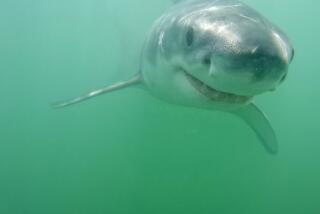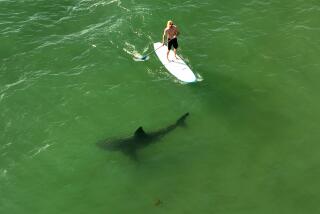Looking out for the great white shark
- Share via
MUIZENBERG, SOUTH AFRICA — Shark spotter Patrick Davids is glad to see the backs of the busloads of visitors who flocked to his powder-white beach over New Year’s, distracting him with surfing spills, near drownings and illicit booze.
In contrast to the human hordes, the great white sharks under his watch behaved impeccably, Davids said. He regards the mighty predators as familiar friends with names like Speedy, Nosy, Rosy and Charlize.
“These sharks aren’t monsters like most people think,” said Davids, standing near the small blue and red beach hut that serves as a command center for his shark-spotting team.
On a mountain drive above Muizenberg, a spotter with binoculars remains in constant contact with Davids. They use a green flag to give the all-clear and a white flag and a siren to sound the alert to clear the water.
The project started five years ago and employs about 15 people from poor backgrounds with funding from the city and conservation groups. Sports shops have donated equipment.
Surfers like Anthony Selley depend on the system. Three years ago he watched as a fin circled a friend on an unmonitored beach and then swam away. It temporarily put him off surfing, but he said he trusted the spotters.
In the last five years, the spotters at several beaches around Cape Town have recorded more than 470 sightings of great whites, the only variety of shark to swim in the chilly local sea. The system isn’t foolproof -- the water is often too murky or choppy to see properly -- but there hasn’t been a single fatal shark attack since the project started.
Cape Town is dominated by the vast Table Mountain National Park, which allows spotters to position themselves high above sea level. But great white expert Alison Kock said even flatter coastal cities could learn from Cape Town’s example.
“You have very large predators swimming very close to shore, and they do occasionally bite people and they are potentially dangerous,” she said. “Usually it’s human nature to fence them off or kill them. The shark spotters are very different.”
Many resorts rely on underwater nets -- at a high cost to marine animals. Nearly two sharks per day die in the nets around Durban, along with mantas, turtles and dolphins.
The Natal Sharks Board, which maintains the nets, said there had been no attacks on netted beaches around Durban for the last 10 years. It is trying to reduce the loss of life among the bull and tiger sharks caught in the nets and -- ironically -- raises money for research and conservation by conducting gory daily public shark dissections for tourists.
Cape Town’s rough waters mean the nets wouldn’t work. And Kock is glad. She thinks the highly intelligent great white usually bites out of curiosity and is unfairly maligned and misunderstood.
Kock has spent more than 2,000 hours working closely with sharks, trying to tag them so their movements can be monitored, as happens with Charlize, a 14-foot female named after South African-born actress Charlize Theron.
Kock has been diving for 12 years, and never once felt threatened. Her mother, who was too worried even to watch shark television documentaries, came along on a tagging trip and was wowed by the grace of the sharks. So was a lifeguard who had lost his foot to a great white and had nightmares until he accompanied Kock on her boat.
South Africa declared the great white a protected species in 1991. The rest of the world followed suit in 2004, after a rapid drop in numbers in waters around Australia and the northwest Atlantic.
But they still remain under threat.
Leonard Compagno, a world-renowned conservationist who is chief scientist at Save Our Seas, said there were probably fewer than 10,000 great whites left -- similar to the number of tigers left in the wild -- because of pollution, depletion of their prey and encroachment on their habitat.
Compagno, whose fascination with sharks started when he was a boy in San Francisco, provided scientific advice to Steven Spielberg’s 1975 movie “Jaws.” He regrets his foray into film. He thinks the movie fueled the myth that sharks are “cruising and looking for people.” In reality, they chase seals and follow schools of fish.
“They eat a wide variety of prey, but one of the things they do not normally target as prey is human beings,” he said.
Save Our Seas last year launched a Rethink the Shark campaign with an ad containing scenes reminiscent of “Jaws,” with panicked swimmers rushing out of the water and beachgoers gazing in terror at the killer: a toaster. The ad maintains that 791 people worldwide were killed by defective toasters in 2007, and only four by great whites.
Eric Myeko confesses that, as a novice spotter in the hills above Muizenberg, he used to quake with fear when he saw the unmistakable shape of the predator. Now he calmly sounds the alert and relishes his role. Before, Myeko worked as a gas station attendant and gardener.
Back on the beach, Davids echoes Myeko’s love of his work. Homeless and jobless, he started out looking after surfers’ cars. Then “the guys on planks” entrusted him with their car keys and cellphones while they hit the waves. Then they bought him his own cellphone so they could call him to check on the swell. Then he was given a surfboard -- and he was hooked.
Davids had learned from fishermen how to spot a shark. When the shark spotters program started, he was the logical choice.
Besides watching for sharks, he gives minor first aid to surfers and swimmers. After watching the crowds during the holidays, when people tried to sneak around the ban on booze at the beach, he said nothing surprised him about the extent of human folly. But for the sharks he has only respect and gratitude.
“Sharks have changed my life,” Davids, 34, said. “Everything I’ve got today is because of sharks. I used to sleep outside. Now I have my own flat, surfboard . . . skipper’s license. I’m becoming a celebrity. I enjoy every minute of it here.”
More to Read
Sign up for Essential California
The most important California stories and recommendations in your inbox every morning.
You may occasionally receive promotional content from the Los Angeles Times.










